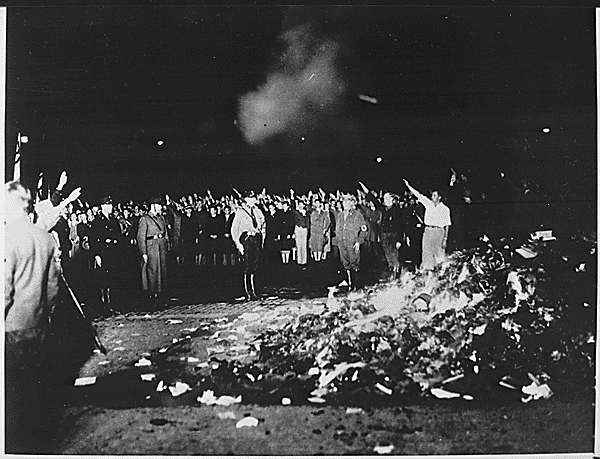Home Front Friday: Burn Baby Burn
Home Front Friday is a regular series that highlights the can do spirit on the Home Front during World War II and illustrates how that spirit is still alive today!
This week was Banned Books Week! Every year, for a week, the freedom from literary censorship is celebrated across the United States. This celebration dates back to World War II when Hitler instated his book burning campaign during the 1930s. The American response to the German Book Burning was overwhelming, both by citizens and by the press.
Authors banned under the Third Reich:
- Albert Einstein
- Friedrich Engels
- Sigmund Freud
- Ernest Hemingway
- Helen Keller
- Jack London
- Thomas Mann
- Karl Marx
- Upton Sinclair
- H. G. Wells
The official title for the Nazi book burning campaign, which started a full 5 years before the War, was an “Action Against the Un-German Spirit.” The most successful and most famous exhibition of the book burning was carried out by German university students on May 10, 1933. A lot of the books that were burned during this exhibition, as well as the books that were banned from the Third Reich throughout the war were books that promoted socialism, books that were either written about or by Jews, and books that the government simply found to be “un-German.”

Germans Giving the Nazi Salute as Banned Books Burn. 1933. Retrieved From: The National Archives Catalog.
As WWII progressed, President FDR would use the book burnings as an important tool to display the vast differences between the American beacon of democracy and the German totalitarian, terrorist Nazi state. The press slashed the book burning and even Eleanor Roosevelt condemned them in her popular daily newspaper column. On the Home Front specifically, the American Jewish Congress organized street demonstrations in more than a dozen U.S. cities, e.g. New York, Philadelphia, Chicago, and Cleveland. The focus of their protests was generally on the Nazi persecution of Jews, but they used the May 10th book burnings to broaden the coalition of anti-Nazi groups.
So, if you want to celebrate banned books week and express your educational and informational freedom, go out and read some of the most influential American literature that was banned under the Third Reich. I would personally recommend Jack London’s The Call of the Wild.
A couple of years ago the Museum had an installation that featured the Nazi book burning campaign. Read more about it here!
Posted by Catherine Perrone, Education Intern and Lauren Handley, Assistant Director of Education for Public Programs at The National WWII Museum.
- Posted :
- Post Category :
- Tags :
- Follow responses to this entry through the RSS 2.0 feed. You can skip to the end and leave a response. Pinging is currently not allowed.




Leave a Reply